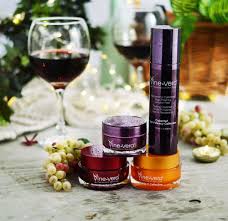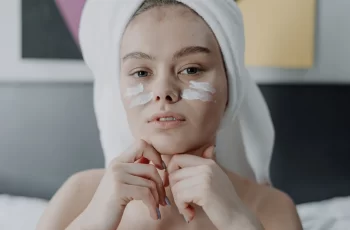
Resveratrol in Skin Care
Resveratrol in skin care products
Resveratrol is an exciting skin care ingredient, notable for its many beneficial properties like antiaging, antioxidant and anti-inflammatory capabilities.
It is commonly found in wrinkle creams, antiaging treatments, sun protection products, sensitive skin treatments, or acne regimens.
Primarily extracted from plant trimmings, resveratrol is a clean, sustainable, natural, and effective additive into many types of skin care products.
To find out if resveratrol is right for your skin concerns or if it fits into your custom skin care regimen, take our quiz and read below!
What is resveratrol?
Resveratrol in skin care is a plant-derived polyphenol usually found in the skin and seeds of grapes and other berries/legumes like peanuts, blueberries, or cranberries.
It has been identified in nearly 70 species of plants around the world and has notable beneficial qualities in both topical and oral use.
Products containing grapeseed oil, rich in resveratrol, have been used in skin care and food for centuries. (15)
Resveratrol is exciting because it has been proposed to express many anti-cancer functions and antiaging activity that warrant further research. (1)
Extracted as a byproduct of agricultural waste, resveratrol has a very low environmental impact to produce.
You can find our full collection of resveratrol products here!
Benefits of resveratrol
Benefits
Resveratrol is known for a number of beneficial properties including:
Antiaging
Antioxidant
Antibacterial
Anticarcinogenic
Anti-inflammatory
Heart health promoting
Helps mitochondria (91)
Tyrosinase inhibiting
It is frequently studied for its effect on various cancers and tumors. (10,19,20)
Resveratrol has demonstrated UV protective qualities as well as anti-inflammatory qualities in research. (15-18)
Most commonly found in grapes, resveratrol is often considered an aid to heart health when present in products like red wine. (5,13,25-28)
Because of these various useful abilities, resveratrol can be found in countless products designed for wrinkles, inflammation, acne, and more.
Side effects
There are no notable side-effects associated with resveratrol.
It is considered to be of low toxicity (28), meaning it is a clean ingredient.
The only reason not to use resveratrol is if it doesn’t fit into your custom skin care regimen!
Is it safe?
Resveratrol is a natural derivative from grapes and is safe for use in skin care according to the CIR. (92) (Cosmetic Ingredient Review Board)
The EWG safety rating for resveratrol is “1,” which means no common concerns are associated with this ingredient.
It is not a likely allergen, and it is safe for use on any skin type. Find your skin type with our quiz today!
Take the Quiz
is resveratrol safe?
Uses
Resveratrol has a variety of uses in skin care, including non-topical applications like supplements.
Resveratrol can be found in moisturizers, sunscreens, serums, antioxidant creams, body lotions, and more.
The main issue with resveratrol is it has low bioavailability, meaning it is processed slowly and inefficiently by the body when unmodified. (28)
Because it is usually processed slowly, it is best combined with ingredients that assist in the delivery and processing of resveratrol in the skin. (51,56)
Studies have found that combining resveratrol with other antioxidant ingredients like vitamin E improves its stability in light and heat. (9)
It has a relatively low shelf life in products when not combined with stabilizing ingredients, typically between 3-6 months. (53)
Even though copious research exists on resveratrol in skin care, more work needs to be done to identify the best complimentary ingredients to deliver it efficiently into the skin.
Issues that limit the effectiveness of resveratrol
Resveratrol in theory is the best skin care ingredient because it has much evidence based research. But, in practice it is not as effective for aging as retinoids and exosomes when used topically.
These are the problems with resveratrol products that limit it’s use in creams and serums:
A high dose is required for benefits
It is an expensive ingredient
It does not absorb well in skin
It has poor shelf life
For these reasons, most people choose to take resveratrol supplements.
Resveratrol is also found in red wine but the dose is not large enough to have major effects even if you drink a lot of red wine.
Resveratrol supplements
Taking supplements made with resveratrol has been shown to contribute to skin health. (42)
There are many benefit to taking oral resveratrol including effects on sirtuin and other aging markers.
Studies have found that oral supplements with this ingredient resulted in skin moisturization and elasticity, as well as lessening of wrinkles. This study concluded that oral supplements containing resveratrol had potential in anti-aging skin care regimens. (42)
However, they are many more much more interesting ongoing studies. We will update here as they become available.
Trans-resveratrol vs cis-resveratrol
What is trans-resveratrol?
There are two primary forms (called isoforms) of resveratrol, trans-resveratrol and cis-resveratrol. (36,37)
They are mirror images of each other but have different effects.
Trans-resveratrol is actually the more commonly used form of resveratrol, it is more stable and expresses more of the beneficial attributes associated with the compound.
The cis form turns into the trans form when exposed to light.
When people are discussing resveratrol in skin care, they are generally referring to trans-resveratrol unless otherwise specified since it is more common.
Resveratrol for specific conditions
Specific conditions
Resveratrol is beneficial for the treatment of concerns like sun damage, wrinkles, keloids, acne, dark spots, sensitive skin, and redness.
It is a potent antioxidant, anti-inflammatory, and antimicrobial compound and can be found in many types of skin care products from sunscreens to wrinkle creams.
If you have specific skin care concerns, be sure to take our skin type quiz to find the best products for your skin type!
Take the Quiz
Sun damage
Resveratrol is helpful for both preventing and treating the effects of sun damage.
This ingredient has been shown to have beneficial interactions with both UVA and UVB radiation, but in different ways.
Studies have found that resveratrol can help induce regulated cell-death (apoptosis) when exposed to UVA radiation. It’s a little complicated, but that basically means that resveratrol helps you get rid of old cells that don’t function properly. (3)
Resveratrol also protects against UVB radiation through multiple mechanisms. (33,34)
For those reasons, resveratrol is a common and good choice for use in sunscreens and sun damage treatment products.
It works best when combined with retinol, sunscreen and other proven antiaging skin care ingredients.
Keloids
Keloids are basically scar tissue that grows thick after healing; they can vary in size and severity.
Resveratrol may be helpful effective in reducing keloids and preventing further growth.
Consider using resveratrol alongside shea butter, which also has keloid treatment benefits.
Investigations have found that resveratrol has antifibrogenic properties, meaning it prevents keloid cells from multiplying and growing while not damaging normal skin fibroblasts. (43)
For this reason, resveratrol is commonly found in products designed to treat keloids.
Resveratrol for wrinkles
Wrinkles
Resveratrol is considered an effective anti-aging ingredient, used in many products to prevent or treat wrinkles and free radicals on the skin.
There are multiple causes of skin aging, and resveratrol has qualities that alleviate multiple skin aging concerns.
Studies have found that resveratrol interacts with particular chemical receptors such as sirtuin in the skin that play a role in skin aging. (11,87)
It is a potent antioxidant, capable of binding free radicals that could otherwise damage DNA in skin cells. (85)
Like most other anti-aging ingredients, resveratrol is best used alongside other clean ingredients with complimentary benefits, like jojoba oil, safflower oil, or borage seed oil.
There are many great anti-aging routines to choose from; are you ready to start an anti-aging regimen?
Hyperpigmentation
Resveratrol is a weak tyrosinase inhibitor, meaning it gets in the way of melanin production in the skin, treating and preventing various kinds of hyperpigmentation.
Like many other skin lightening ingredients, resveratrol is not particularly effective on its own at lightening dark spots. (45,46)
Combine it together with other skin lightening ingredients such as:
Arbutin
Cysteamine
Ferulic acid
These and other ingredients are great for dark spot treatments and skin care routines designed for concerns like melasma or PIH.
Acne
Resveratrol is often a good choice for acne treatments because it anti-inflammatory and can help your skin tolerate other acne medications like retinoids and benzoyl peroxide.
One study found that after 60 days, no adverse reactions to the ingredient were reported and symptoms of acne were greatly alleviated. (37)
Resveratrol was reported in this same study to reduce the size of clogged pores and assist in wound healing.
Resveratrol is not comedogenic.
Many products that target bacteria, redness, or inflammation related to acne might benefit from including resveratrol in their formulation.
Redness
Resveratrol is good for soothing redness on the skin and can be safely used if you have rosacea.
One small study found that resveratrol made noticeable improvements in skin redness within 6 weeks of treatment. (49)
If you are suffering from recurring redness on the skin, resveratrol might be good for your custom skin care regimen.


